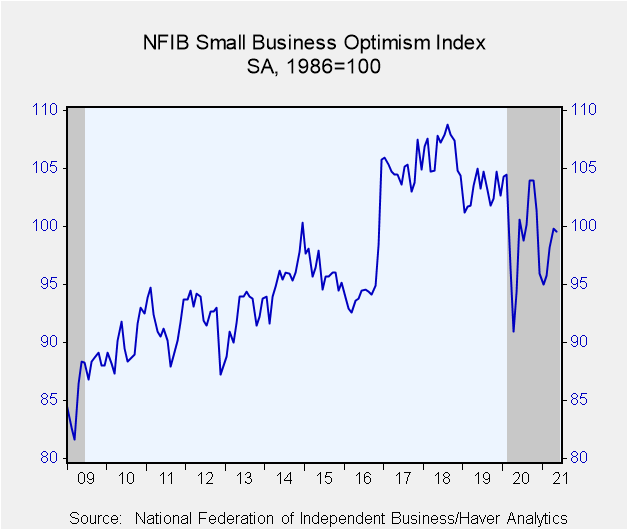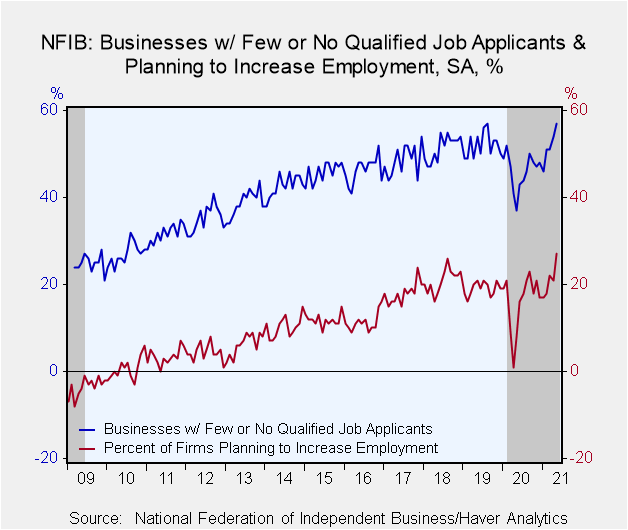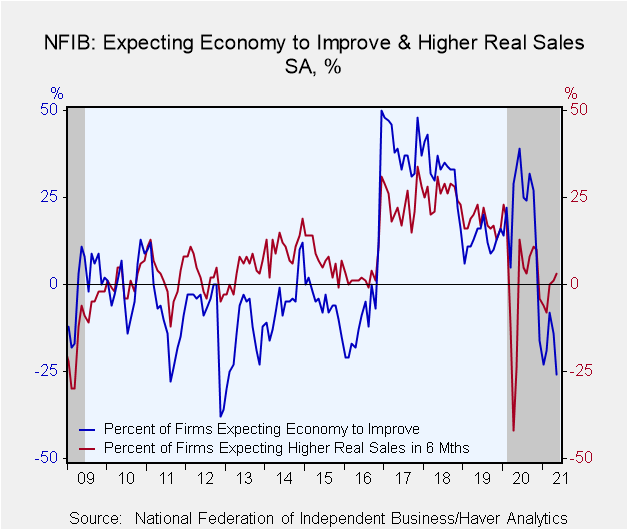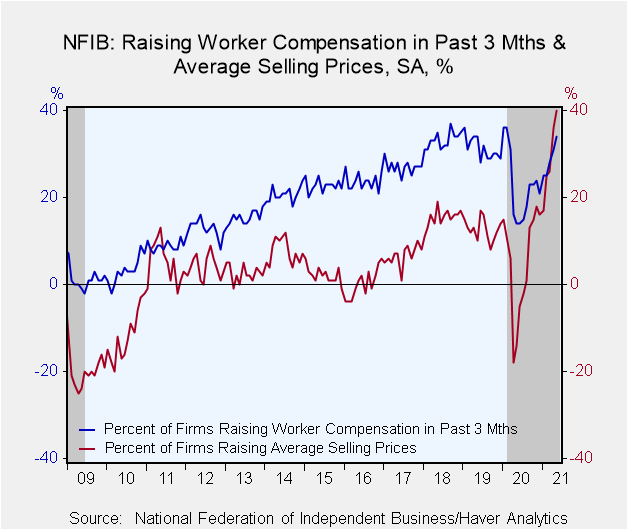 Global| Jun 08 2021
Global| Jun 08 2021U.S. NFIB Small Business Optimism Index Eases in May
by:Tom Moeller
|in:Economy in Brief
Summary
• Slip follows three months of increase. • Components are mixed. • Pricing power continues to strengthen. The National Federation of Independent Business (NFIB) reported that its Small Business Optimism Index rose slipped to 99.6 [...]
• Slip follows three months of increase.
• Components are mixed.
• Pricing power continues to strengthen.
The National Federation of Independent Business (NFIB) reported that its Small Business Optimism Index rose slipped to 99.6 during May from an unrevised 99.8 during April. The NFIB release indicated that "the labor shortage is holding back growth for small businesses across the country."
A lessened net -26% of respondents were expecting the economy to improve, down from the June 2020 high of +39%. That decline was countered by a slightly improved m/m net 3% who expected higher real sales, though that remained below a 13% high last June. A slightly lessened net 13% felt that now was a good time to expand the business. A steady net 27% were planning to make capital expenditures, but that was increased from 20% in May of last year.
A record net 27% of firms planned to increase employment, up from 21% in April. An increased 57% were finding few or no qualified candidates to fill job openings, up from 37% in May 2019. It matched a record reached in August 2019. Worker compensation was lifted by a net 34% of firms, up from 14% twelve months earlier. A higher 22% planned to raise compensation, double the percentage 12 months earlier.
The reading of earnings trends eased m/m to -11, but remained up from -15 in March.
Credit was hard to get by an increased two percent of respondents, the most since December.
Pricing power surged with a net 40% of firms raising prices in May, the most since April 1980. A near-record net 43% of firms planned to raise prices
Important issues for small businesses were an increased quality of labor (26%), up from 17% twelve months ago and taxes, 22%, the most since November 2017. Government requirements (13%) and rising labor costs (8%) also were important issues.
Roughly 24 million small businesses exist in the U.S. and they create 80% of all new jobs. The typical NFIB member employs 10 people and reports gross sales of about $500,000 a year. The NFIB figures can be found in Haver's SURVEYS database.
| National Federation of Independent Business (SA, Net % of Firms) | May | Apr | Mar | May '20 | 2020 | 2019 | 2018 |
|---|---|---|---|---|---|---|---|
| Small Business Optimism Index (1986=100) | 99.6 | 99.8 | 98.2 | 94.4 | 99.6 | 103.0 | 106.7 |
| Firms Expecting Economy to Improve | -26 | -14 | -8 | 34 | 20 | 13 | 32 |
| Firms Expecting Higher Real Sales | 3 | 1 | 0 | -24 | 1 | 18 | 26 |
| Firms Reporting Now Is a Good Time to Expand the Business | 13 | 14 | 11 | 5 | 13 | 25 | 30 |
| Firms Planning to Increase Employment | 27 | 21 | 22 | 8 | 16 | 19 | 21 |
| Firms With Few or No Qualified Applicants for Job Openings (%) | 57 | 54 | 51 | 37 | 46 | 52 | 51 |
| Earnings Trends | -11 | -7 | -15 | -26 | -16 | -5 | -2 |
| Firms Reporting that Credit Was Harder to Get | 2 | 3 | 1 | 2 | 3 | 4 | 4 |
| Firms Raising Average Selling Prices | 40 | 36 | 26 | -14 | 5 | 13 | 15 |
| Firms Raising Worker Compensation | 34 | 31 | 28 | 14 | 23 | 31 | 33 |
Tom Moeller
AuthorMore in Author Profile »Prior to joining Haver Analytics in 2000, Mr. Moeller worked as the Economist at Chancellor Capital Management from 1985 to 1999. There, he developed comprehensive economic forecasts and interpreted economic data for equity and fixed income portfolio managers. Also at Chancellor, Mr. Moeller worked as an equity analyst and was responsible for researching and rating companies in the economically sensitive automobile and housing industries for investment in Chancellor’s equity portfolio. Prior to joining Chancellor, Mr. Moeller was an Economist at Citibank from 1979 to 1984. He also analyzed pricing behavior in the metals industry for the Council on Wage and Price Stability in Washington, D.C. In 1999, Mr. Moeller received the award for most accurate forecast from the Forecasters' Club of New York. From 1990 to 1992 he was President of the New York Association for Business Economists. Mr. Moeller earned an M.B.A. in Finance from Fordham University, where he graduated in 1987. He holds a Bachelor of Arts in Economics from George Washington University.
More Economy in Brief
 Global| Feb 05 2026
Global| Feb 05 2026Charts of the Week: Balanced Policy, Resilient Data and AI Narratives
by:Andrew Cates










